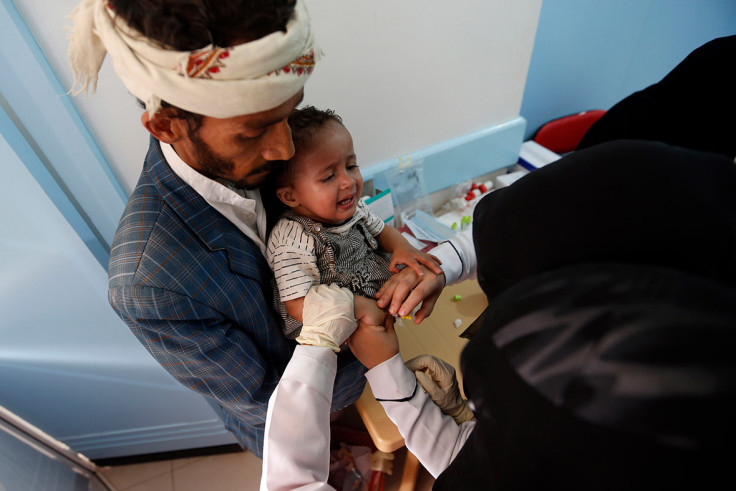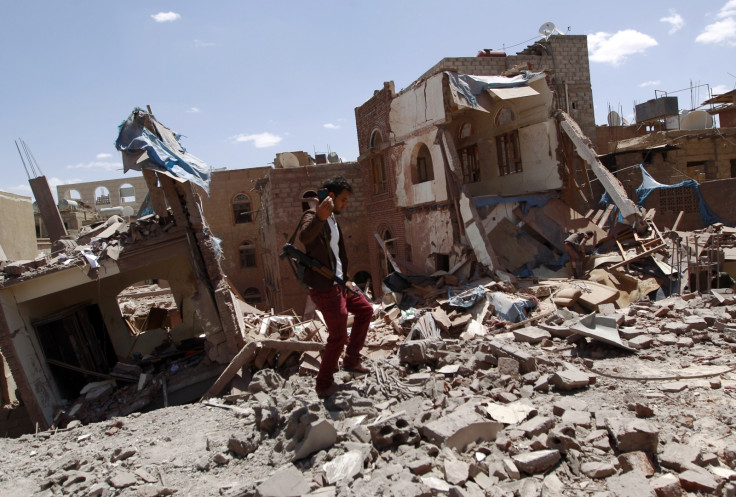Helping war-torn Yemen is Boris Johnson's chance to step up UK foreign policy - will he take it?
Yemen has been the site of a brutal civil war and a deep humanitarian crisis since conflict erupted in 2015.
In July, UK Foreign Secretary Boris Johnson said that "promoting human rights is an essential aim of the foreign policy of a global Britain. To do otherwise would be unthinkable".
Yemen – site of the world's largest humanitarian crisis and an armed conflict rife with war crimes – is the clearest possible test of whether his words mean something beyond bombast. So far, they do not.
Conditions in Yemen are appalling and are getting worse. A least 80% of the population needs humanitarian aid, more than 7 million people are hungry, and a cholera epidemic has infected some 500,000 people.
Stephen O'Brien – the United Nation's humanitarian chief, and a former Conservative MP and minister – has described the crisis in chilling detail, condemned the brazen obstruction of aid relief by all sides, and called for an international inquiry into the war's all-too-common abuses.
Ministers emphasise that Britain is the world's third largest aid donor to the Yemen conflict. True.
Yet, these humanitarian efforts have been gravely and cynically undermined by Britain's wider policy towards the Yemen war - not least its massive arming of Saudi Arabia (£3.5bn worth of weapons and materiel transferred in 2015 alone), its largely uncritical political backing for Saudi and the coalition it leads, and its dogged and disingenuous refusal to acknowledge that all sides to the conflict are committing grave violations of the laws of war, including apparent war crimes.
Conflict in Yemen at a glance
- Yemen has been ravaged by a civil war since 2015.
- The conflict has pitted Iran-allied Houthi forces – who control the capital Sana'a and are allied with loyalists of former president Ali Abdullah Saleh – against forces allied to the ousted government of Abdrabbuh MansurHadi, based in Aden, supported by a coalition led by Saudi Arabia.
- Riyadh and its allies aim to restore Hadi's government.
- Both warring sides claim they constitute the government of the country.
British policy, along with that of the US and France, has stoked and exacerbated these abuses.
The latest report on Yemen from the office of the UN human rights chief, Zeid Ra'ad al-Hussein, is extraordinarily damning. At least 5,000 civilians have been killed and 8,700 wounded, most by coalition air strikes, although the Houthi-Saleh forces the coalition is fighting have committed grave violations as well.
The report's findings corroborate Human Rights Watch's on-the-ground investigations, who have documented scores of unlawful attacks by all sides, including Houthi-Saleh forces laying landmines and repeatedly shelling a major Yemeni city, as well as 87 unlawful air strikes by Britain's ally, the coalition, that have unlawfully hit schools, markets, homes and hospitals.
No party on either side has seriously investigated, much less held to account, those responsible for violating the laws of war.
This has not stopped the British government from making extraordinary excuses for the Saudi-led coalition, suggesting their half-hearted investigations into just over two dozen air strikes indicate real commitment and progress, and mitigate the need for an impartial, independent inquiry. They are anything but.

In a letter to Human Rights Watch last week, the Middle East Minister, Alistair Burt, wrote: "Our view is that it is for the Coalition itself, in the first instance, to conduct such investigations. They have the best insight into their own military procedures and will be able to conduct the most thorough and conclusive investigations."
Burt's claims are absurd. While coalition members have an international legal obligation to investigate alleged abuses, the coalition has only published information on some 30 strikes, less than 5% of all possibly unlawful strikes identified by the UK's Ministry of Defence – and this two and a half years into the conflict.
Moreover, as the High Commissioner's office says of the Saudi-led coalition's investigation into its own conduct, there have been "no concrete actions taken on either prosecutions or on reparations to the victims and survivors of such incidents" and "efforts towards accountability are wholly insufficient".
There is a growing chorus calling for the upcoming UN Human Rights Council session in Geneva to establish an independent international inquiry to investigate violations committed by all sides to the conflict.
The Dutch government is leading the initiative – now joined by Canada – and there is support from the UN human rights commissioner and the Security Council Panel of Experts on Yemen, 67 international, regional and domestic rights groups, 14 aid organisations operating in Yemen, and Yemeni civil society groups from across the country.
The newly-elected chairs of the UK's foreign affairs and international development select committees, Tom Tugendhat and Stephen Twigg, have urged the UK government to get on board.
UK officials have told Human Rights Watch that London has yet to take a decision on an international inquiry. If Britain fails to support this initiative, it would be a disgraceful move, making a mockery of Boris Johnson's claims that UK foreign policy is values-driven.
Johnson has come under sustained criticism over the summer. Yemen is his chance to step up – to match the gravity of events on the ground with a strong British policy, rooted in justice and compassion, which can help build a better future for ordinary Yemenis. Will he take it?

David Mepham is UK Director of Human Rights Watch Follow him on Twitter @mephamd.
© Copyright IBTimes 2025. All rights reserved.






















